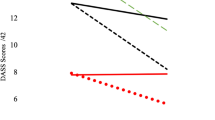Abstract
Background:
It has not been established whether control conditions with large weight losses (WLs) diminish expected treatment effects in WL or prevention of weight gain (PWG)-randomized controlled trials (RCTs).
Subjects/Methods:
We performed a meta-analysis of 239 WL/PWG RCTs that include a control group and at least one treatment group. A maximum likelihood meta-analysis framework was used to model and understand the relationship between treatment effects and control group outcomes.
Results:
Under the informed model, an increase in control group WL of 1 kg corresponds with an expected shrinkage of the treatment effect by 0.309 kg (95% confidence interval (−0.480, −0.138), P=0.00081); this result is robust against violations of the model assumptions.
Conclusions:
We find that control conditions with large WLs diminish expected treatment effects. Our investigation may be helpful to clinicians as they design future WL/PWG studies.
This is a preview of subscription content, access via your institution
Access options
Subscribe to this journal
Receive 12 print issues and online access
$259.00 per year
only $21.58 per issue
Buy this article
- Purchase on Springer Link
- Instant access to full article PDF
Prices may be subject to local taxes which are calculated during checkout

Similar content being viewed by others
References
Leon AC, Solomon DA . Toward rapprochement in the placebo control debate. Eval Health Prof 2003; 26/4: 404–4414.
Schmid CH, Lau J, McIntosh MW, Cappelleri JC . An empirical study of the effect of the control rate as a predictor of treatment efficacy in meta-analysis of clinical trials. Stat Med 1998; 17: 1923–1942.
McIntosh MW . The population risk as an explanatory variable in research synthesis of clinical trials. Stat Med 1996; 15: 1713–1728.
Affuso O, Kaiser KA, Carson TL, Ingram KH, Schwiers M, Robertson H et al. Associations of run-in periods with weight loss in obesity randomized controlled trials. Obes Rev 2013; 15: 68–73.
Dempster AP, Laird NM, Rubin DB . Maximum likelihood estimation from incomplete data. J R Stat Soc Ser B 1977; 39: 1–38.
Meng X-L, Rubin DB . Using EM to obtain asymptotic variance-covariance matrices: the SEM algorithm. JASA 1991; 86/416: 899–909.
Gelman A, Carlin JB, Stern HS, Rubin DB Bayesian data analysis, 2nd edn. Chapman and Hall/CRC: Boca Raton, FL, USA, 2004.
IBM Corporation SPSS version 20. IBM: Armonk, NY, USA, 2012.
R Development Core Team R: A language and environment for statistical computing. R Foundation for Statistical Computing: Vienna, Austria, 2009.
US Food and Drug Administration. Developing products for weight management: draft guidance. http://www.fda.gov/Drugs/GuidanceComplianceRegulatoryInformation/Guidances/ucm064981.htm. Accessed 14 May 2015.
Allison DB, Elobeid MA, Cope MB, Brock DW, Faith MS, Sargent S et al. Sample size in obesity trials: Patient perspective vs current practice. Med Decis Making 2010; 30: 68–75.
Acknowledgements
DBA conceived the analysis. GRC advised on study design and data collection/coding approaches. KAK and OA collected and coded the data. KAK performed the multiple imputation of the missing data. JAD coded and performed the analyses. All authors were involved in writing the paper and had final approval of the submitted and published versions. We would like to thank Christopher Schmid for comments and feedback that helped improve the manuscript. We would also like to thank Tiffany Carson, Katherine Ingram and Firas Abbas for assistance in data collection and coding. This work was primarily funded by Grant Number R01DK078826, with other support from T32HL072757, P30DK056336, T32HL007457, T32HL079888 and T32DK062710. The content is solely the responsibility of the authors and does not necessarily represent the official views of the NHLBI, NIDDK or the National Institutes of Health.
Author information
Authors and Affiliations
Corresponding author
Ethics declarations
Competing interests
JAD and KAK have no conflicts of interest to declare. OA has received consulting fees and grants from organizations interested in obesity interventions. GRC has had the following consulting or DSMB commitments within the past 12 months: Apotek, Biogen-Idec, Cleveland Clinic, Glaxo Smith Klein Pharmaceuticals, Gilead Pharmaceuticals, Modigenetech/Prolor, Merck/Ono Pharmaceuticals, Merck, Neuren, PCT Bio, Revalesio, Sanofi-Aventis, Teva, Vivus, NHLBI (Protocol Review Committee), NINDS, NMSS and NICHD (OPRU oversight committee). In addition, GRC has consulted, recieved speaking fees or acted as part of an advisory boards for the following: Alexion, Allozyne, Bayer, Celgene, Coronado Biosciences, Consortium of MS Centers (grant), Diogenix, Klein-Buendel Incorporated, Medimmune, Novartis, Nuron Biotech, Receptos, Spiniflex Pharmaceuticals and Teva pharmaceuticals. GRC is employed by the University of Alabama at Birmingham and is President of Pythagoras, Inc., a private consulting company located in Birmingham AL. DBA has received consulting fees and his university has received gifts, grants and donations from multiple non-profit and for-profit organizations with interests in obesity trials including food and pharmaceutical companies.
Additional information
Supplementary Information accompanies this paper on International Journal of Obesity website
Rights and permissions
About this article
Cite this article
Dawson, J., Kaiser, K., Affuso, O. et al. Rigorous control conditions diminish treatment effects in weight loss-randomized controlled trials. Int J Obes 40, 895–898 (2016). https://doi.org/10.1038/ijo.2015.212
Received:
Revised:
Accepted:
Published:
Issue Date:
DOI: https://doi.org/10.1038/ijo.2015.212
This article is cited by
-
Does the incorporation of portion-control strategies in a behavioral program improve weight loss in a 1-year randomized controlled trial?
International Journal of Obesity (2017)



